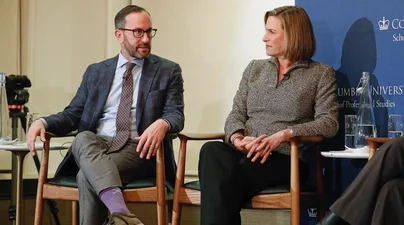The 2024 presidential election was shaped by a number of extraordinary circumstances, including an 11th-hour top-ticket candidate change, a former president running for reelection, and polarizing domestic issues and global events shaping the conversation.
On November 14, leaders in the field of political analytics gathered at Columbia’s Faculty House to discuss the aftermath of this historic election. Hosted by the Columbia University School of Professional Studies (SPS) M.S. in Political Analytics program, Political Analytics: Insights from the 2024 Election offered members of the Columbia community an opportunity to gain a better understanding of the role of political analytics just days after the conclusion of this year’s race.
The evening featured a panel discussion moderated by Dr. Gregory Wawro, director of the M.S. in Political Analytics program, which allowed attendees to hear from experts in political analytics who are able to analyze and interpret political outcomes using data.
The panel featured:
- Dr. Alissa Stollwerk, vice president of research data and analytics technology group YouGov Blue (which serves progressive and Democratic clients), who shared election insights based on the data collected by her team.
- Dr. Basil Smikle Jr., professor of practice and director of Columbia’s M.S. in Nonprofit Management program and an MSNBC political analyst, who brought key insights into the role of mass media in the 2024 election.
- Susan Del Percio, an NBC and MSNBC analyst, who reflected on her experience in crisis communications and political strategy. As a Never Trump Republican, Del Percio shared concerns about the evolving composition of the GOP.
- Jefrey Pollock, founding partner and president of Global Strategy Group (GSG), a top Democratic pollster, who shared data-driven explanations for the outcome of the election.
All panelists are leaders in their fields, and all worked closely on the 2024 election. Their diverse backgrounds made for a spirited discussion as they shared differing conclusions and explanations for this year’s election results.

(left to right): Jefrey Pollock, Founding Partner & President, Global Strategy Group; Gregory Wawro, Ph.D., Professor of Political Science and Program Director, Political Analytics; Susan Del Percio, Founder, Susan Del Percio Strategies; MSNBC Political Analyst; Alissa Stollwerk, Ph.D., Vice President, YouGov Blue; Basil Smikle, Ph.D., Professor of Practice and Director, M.S. in Nonprofit Management Program
The Role of the Economy
One major focus of the evening’s discussion was the role of the economy in influencing voting behavior. With many voters experiencing the residual effects of pandemic inflation, dissatisfaction with the economy was widespread, and exit polls revealed that the economy was a key issue influencing the way voters behaved in this election.
Some panelists found that the economy ran deeper than just prices and inflation in the eyes of voters. “There is a difference between what people felt in their own pockets versus what they thought their neighbors were feeling,” said Dr. Alissa Stollwerk. “A lot of times when you ask people, they will state that their economic situation is good, but the economy is bad. … I think there is a wider question of the narratives that are being driven in our fractured media environment.”
The panelists also debated the influence of such traditional financial markers as the price of eggs in this year’s race, questioning whether they were truly key drivers in the election results.
“I struggle with whether the economy [alone] was an issue here,” said Dr. Basil Smikle Jr., director of the Columbia SPS M.S. in Nonprofit Management program, “Somewhere on the permission structure where Trump got people to vote for him, he spent more time talking about what Haitains eat than the price of eggs. … When you set that dialogue out there, you aren’t talking about the economy—you are validating people’s feelings and concerns at a very base level that gets them to the point where they say, ‘My economic situation is not where it should be because we are dealing with all of these issues with people on the side.’ ”
Democratic pollster Jefrey Pollock emphasized that at the core of the Trump campaign was the peddling of the narrative that economic dissatisfaction harks back to the policy set forth by the Biden administration. “There was a billion dollars spent [by Trump] on advertising,” said Pollock, “and 50% of those advertisements were spent talking about ‘Bidenomics’ and the economy. When I think about the swing states, it’s hard for me to not see that the economy was dominant.”

(left to right): Jefrey Pollock, Founding Partner & President, Global Strategy Group; Susan Del Percio, Founder, Susan Del Percio Strategies; MSNBC Political Analyst
The Importance of Aligning with Voter Bases
Panelists discussed the fundamental issue of aligning with a political candidate’s voting base, which many felt Harris and other Democratic candidates struggled to achieve.
Analyst Susan Del Percio reflected on her experience working with the Lincoln Project, an anti-Trump political action committee founded by Republican and moderate political strategists. As a voice for Republicans and moderates, this PAC has played a unique role in swaying Republicans to vote blue for the sake of democracy.
“I worked on the Lincoln Project—Republicans and Independents for Biden in 2020. I didn’t think that that was a good strategy for Biden or Harris in 2024.
“There had to be something in the numbers and the private polling that showed she didn’t have a [voter] base, because she spent so much of the closing campaign with Liz Cheney,” added Del Percio. “I can only say they knew they didn’t have a base and knew they had to get numbers from somewhere else.”
Dr. Smikle addressed the possible failures of the Democratic Party to address the struggles of the average American. As a result, many voters felt alienated from the party, he suggested, which could have contributed to Harris’s loss.
“What Democrats are being accused of is cultural elitism. … The kind of ads being played [by the Trump campaign] were a response to the notion that Democrats are these cultural elites and are not really going to the voter where they are,” said Smikle. “Democrats were not talking about the things that they believe Americans are dealing with in their day-to-day lives.”
Following the panel, audience members had the opportunity to ask questions about election results, polling, and more. The panel’s insights inspired thoughtful discussions among attendees, many of whom thanked the speakers for their timely analysis of the election results.
About the Program
The Columbia University M.S. in Political Analytics program provides students quantitative skills in an explicitly political context, facilitating crosswalk with nontechnical professionals and decision-makers—and empowers students to become decision-makers themselves.
The 36-credit program is available part-time and full-time, on-campus and online. The fall 2025 application priority deadline for the M.S. in Political Analytics program is February 15. The final deadline is June 1. Learn more about the program here.
For general information and admissions questions, please call 212-854-9666 or email politicalanalytics [[at]] sps [[dot]] columbia [[dot]] edu (politicalanalytics[at]sps[dot]columbia[dot]edu).



